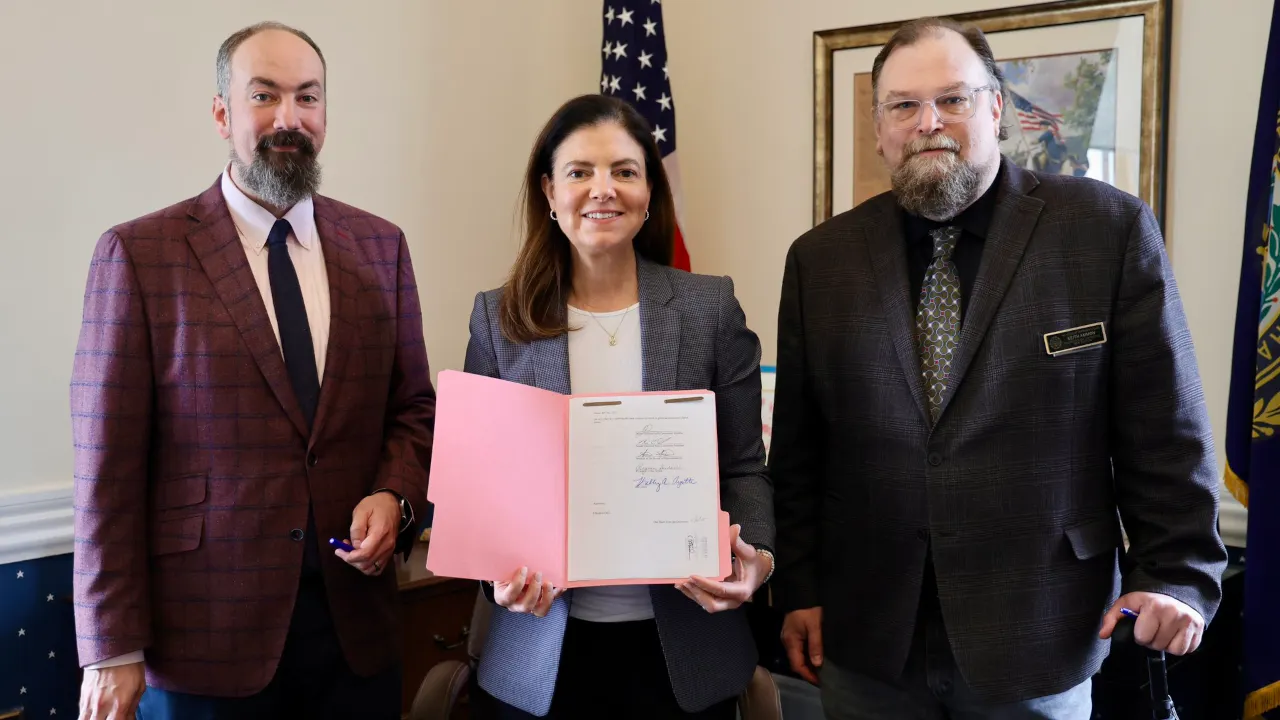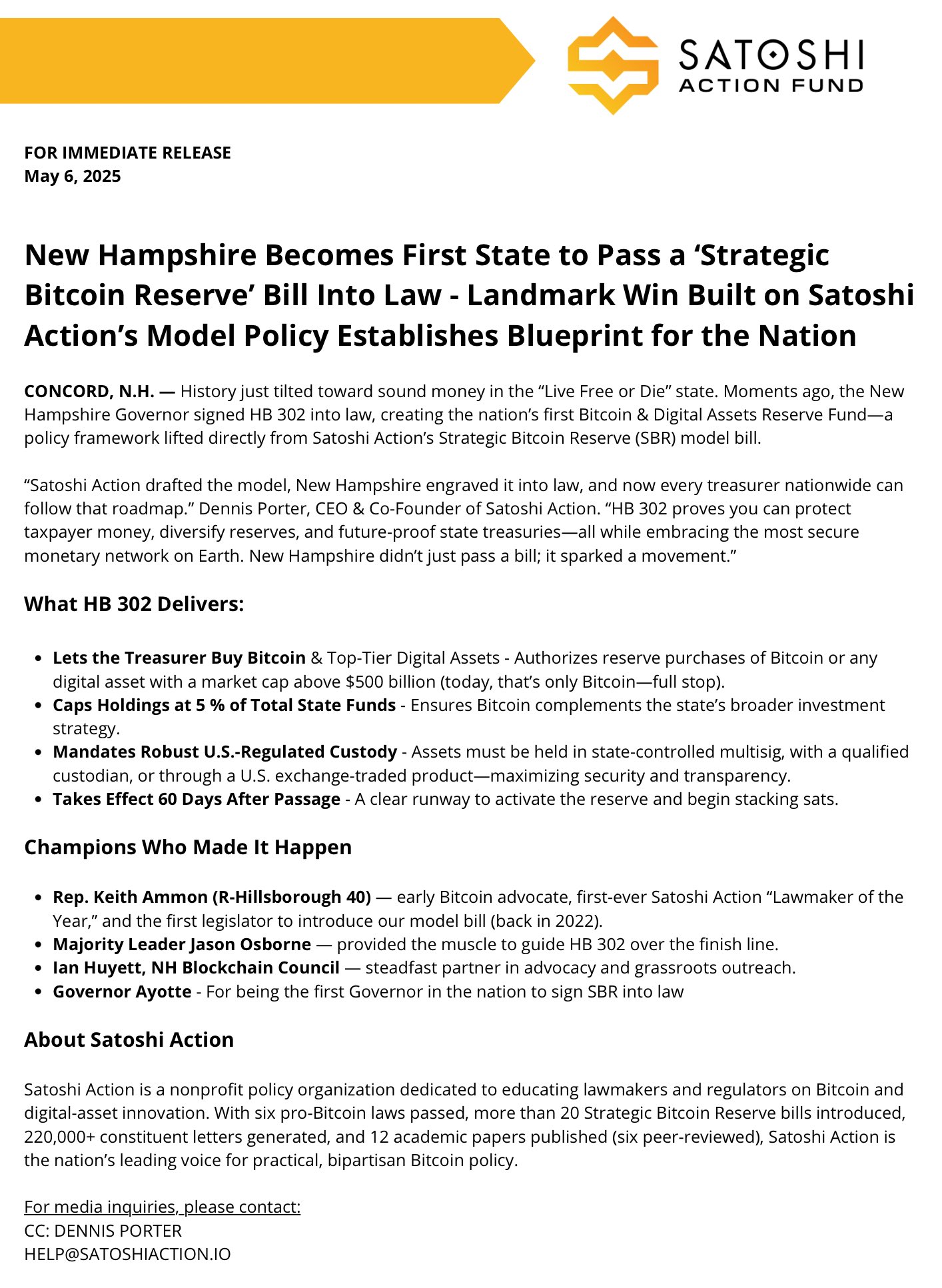
A Milestone in U.S. Financial History
On May 7, 2025, New Hampshire made a significant mark in financial history. Governor Kelly Ayotte signed the HB302 bill, making the state the first in the U.S. to officially include cryptocurrency—specifically Bitcoin—in its strategic reserves. This groundbreaking legislation will take effect in 60 days, allowing the state treasury to invest up to 5% of its public funds in digital assets with a market capitalization exceeding $500 billion, as well as precious metals like gold and silver. Currently, only Bitcoin, with a market cap of approximately $1.88 trillion, meets this criterion, positioning New Hampshire as a pioneer in the mainstreaming of cryptocurrency.
The significance of this move extends far beyond state lines. It marks a shift in the U.S. government's attitude towards digital assets from skepticism to strategic acceptance. As the first state to implement such a policy, New Hampshire is not just testing the waters but boldly embracing a future where Bitcoin could stand alongside traditional assets like gold. This article will delve into the details of the HB302 bill, its potential economic impact, similar legislative progress in other states, and the broader implications of Bitcoin's role in global finance.
Deconstructing HB302: A Bold Financial Experiment
The HB302 bill was introduced by Republican Representative Keith Ammon and passed with bipartisan support, narrowly winning in the state House of Representatives with a vote of 192 to 179 and in the Senate committee with a vote of 4 to 1. The bill authorizes the state treasurer to invest up to 5% of public funds (including the general fund and revenue stabilization fund) in eligible digital assets and precious metals. The initial proposal suggested a 10% allocation, but concerns about volatility and security led to a reduction in the final version to 5%.
The bill explicitly requires investments in assets with a market cap exceeding $500 billion, making Bitcoin the only cryptocurrency that meets this standard, while the second-ranked Ethereum has a market cap of only about $214 billion. This specificity highlights Bitcoin as the only digital asset with the scale and stability suitable for state-level investment. The bill also outlines secure custody methods, allowing assets to be held through state-controlled multi-signature wallets, qualified custodians, or exchange-traded products, ensuring robust security measures.

Potential Purchasing Power
New Hampshire's total budget for the 2025 fiscal year is approximately $15.4 billion, with the general fund around $5.6 billion. Based on the 5% cap, the state could allocate between $280 million and $770 million for investments in Bitcoin and precious metals. State Treasurer Monica Mezzapelle indicated that initial investments might start as a pilot program, approximately $180 million, to test market reactions before gradually expanding.
To put this into perspective, if New Hampshire invests $280 million in Bitcoin at a price of $95,000 per coin (a reasonable estimate based on recent market trends), it could purchase about 2,947 Bitcoins. If it invests $770 million, it could acquire about 8,105 Bitcoins, which would represent 0.04% of Bitcoin's total circulating supply of 19.7 million coins. While this is not a large scale globally, this allocation would make New Hampshire a significant institutional holder, demonstrating confidence in Bitcoin's long-term value.
The passage of this bill coincides with Bitcoin's price breaking the $100,000 mark, partly due to an executive order signed by President Trump in March 2025, announcing the establishment of a national Bitcoin reserve using 200,000 seized Bitcoins. New Hampshire's initiative further amplifies this momentum, potentially driving prices higher as institutional demand continues to grow.
Why New Hampshire? The Unique Position of the Granite State
New Hampshire's passage of HB302 is no coincidence. The state is known for its motto "Live Free or Die," which has long fostered a culture of independence and innovation. With no state sales tax and minimal regulatory burdens, it has become a haven for businesses and individuals seeking financial freedom. The state has also attracted blockchain enthusiasts and libertarians through initiatives like the "Free State Project," creating a crypto-friendly environment.
HB302 aligns with this spirit, positioning Bitcoin as a tool against inflation to protect the purchasing power of state funds. Unlike traditional assets, Bitcoin's decentralized nature and fixed supply cap of 21 million coins make it an attractive store of value, especially in an era of rising federal debt and increasing monetary uncertainty. By including precious metals in the bill, lawmakers have placed Bitcoin alongside gold, positioning it as a "hard asset" during turbulent times.
Ripple Effects: Legislative Progress in Other States
New Hampshire's groundbreaking move is not an isolated event. At least 26 states across the U.S. have proposed or are actively considering legislation to establish Bitcoin or digital asset reserves, reflecting a growing recognition of cryptocurrency's potential. These efforts are driven by federal encouragement and the mainstreaming of Bitcoin, with varying scopes and progress. Below is an overview of several key states and their initiatives based on existing data.
Arizona: Following Closely
Arizona has emerged as a strong candidate for establishing a Bitcoin reserve. In April 2025, the state House passed two bills, SB1373 and SB1025, allowing the state treasurer to invest up to 10% of public funds in Bitcoin and other digital assets. These bills are awaiting the signature of Governor Katie Hobbs, and if passed, Arizona could become the second state with an official reserve. Based on its budget of approximately $18 billion, a 10% cap could translate to an investment of $1.8 billion, far exceeding New Hampshire's. However, Democratic Governor Hobbs remains skeptical, and the possibility of a veto still exists.
Ohio: Long-Term Commitment
Ohio's SB57 bill, introduced by Senator Sandra O’Brien in January 2025, takes a bold approach. The bill authorizes direct investment in Bitcoin, requiring a minimum holding period of five years, mandates state agencies to accept cryptocurrency payments, and allows residents and institutions to donate Bitcoin to the reserve. The bill is currently under review by the Senate Finance, Insurance, and Technology Committee and has garnered attention for its ambitious scope, though it faces obstacles. Based on Ohio's budget of $86 billion, a 10% cap could support an investment of $8.6 billion, although initial allocations may be more conservative.
Texas: Embracing Decentralization
Texas, as a hub for crypto innovation, saw Representative Giovanni Capriglione introduce the Texas Strategic Bitcoin Reserve Act in December 2024. This bill establishes a dedicated fund for Bitcoin, managed by the state auditor, requiring a minimum holding period of five years and allowing public donations. Based on Texas's budget of over $150 billion, a 10% cap could support an investment of $15 billion, making it a potential heavyweight in state-level Bitcoin adoption. The bill is still in its early stages, with committee reviews ongoing.
Oklahoma and Florida: Gaining Momentum
Oklahoma's HB1203 bill, introduced by Representative Cody Maynard, aims to establish a Bitcoin reserve to leverage its growth potential. Florida is also advancing legislation allowing the state treasurer to invest in Bitcoin, with a House vote imminent. Both states have budgets far exceeding New Hampshire's, and if the bills pass, potential investments could range from $1 billion to $3 billion.
Rhode Island: Flexible Strategy
Rhode Island's HB6007 bill authorizes the state treasurer and retirement system to invest in Bitcoin and other digital assets to hedge against inflation. The bill has a broad definition of digital assets, including stablecoins and NFTs, reflecting a more inclusive strategy. Based on a budget of approximately $14 billion, Rhode Island could allocate up to $700 million. The bill is currently under committee review, with discussions ongoing.
Obstructed Efforts and Opposition
Not all states are embracing Bitcoin reserves. Pennsylvania, Montana, North Dakota, Wyoming, and South Dakota have rejected similar bills, citing concerns over volatility, energy consumption, and risks to taxpayer funds. Wyoming's rejection is particularly notable, given Senator Cynthia Lummis's active advocacy for Bitcoin at the federal level. These setbacks highlight the challenges of balancing innovation with fiscal prudence.
Potential Purchasing Power Across States
If all 26 states with active or proposed Bitcoin reserve bills adopt a 5-10% allocation, the collective purchasing power would be staggering. Assuming an average state budget of $30 billion, with a conservative 5% cap, the 26 states could collectively invest $39 billion, enough to purchase approximately 410,500 Bitcoins at a price of $95,000 each, representing 2% of Bitcoin's circulating supply. If the cap were set at 10%, this figure could double to $78 billion, or 821,000 Bitcoins. Such demand could significantly drive prices up, given Bitcoin's limited supply.
However, political and economic realities constrain this potential. Democratic-led states like California and New York are unlikely to pursue such policies, while Republican strongholds like Texas and Florida are more enthusiastic. Actual investments may occur in phases, with New Hampshire's $180 million pilot program potentially setting a precedent for other states.
A New Era for Bitcoin
New Hampshire's HB302 represents a watershed moment, not just for the state but for the global perception of Bitcoin. By legalizing cryptocurrency as a strategic asset, the Granite State has opened the door for other states. While the direct financial impact—potential investments of $280 million to $770 million—may be limited, its symbolic significance is immense. It signals that Bitcoin is no longer a fringe experiment but a serious contender in the financial world.
As states like Arizona, Texas, and Ohio advance their own bills, the U.S. may be on the brink of a wave of institutional Bitcoin adoption, reshaping markets and policies. For investors, this is a clear signal: Bitcoin's role as a store of value is gaining recognition, and its weight in investment portfolios may increase. For skeptics, it presents a challenge to reassess the assumptions about digital assets in a rapidly changing world.
In 60 days, when HB302 takes effect, New Hampshire will embark on its journey as a crypto pioneer in the U.S. Whether this will spark a revolution or become a cautionary tale remains to be seen, but one thing is clear: the Granite State has just changed the game.
免责声明:本文章仅代表作者个人观点,不代表本平台的立场和观点。本文章仅供信息分享,不构成对任何人的任何投资建议。用户与作者之间的任何争议,与本平台无关。如网页中刊载的文章或图片涉及侵权,请提供相关的权利证明和身份证明发送邮件到support@aicoin.com,本平台相关工作人员将会进行核查。




